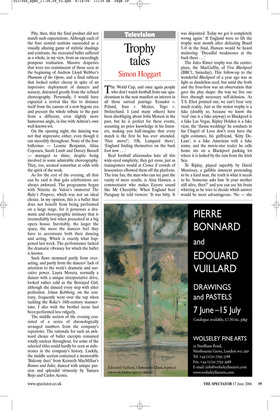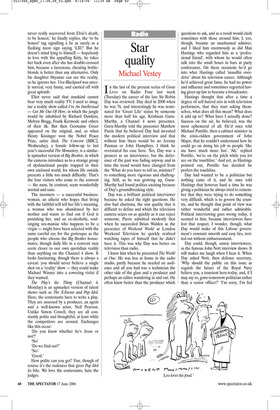Trophy tales
Simon Hoggart
The World Cup, and once again people who don’t watch football from one quadrennium to the next manifest an interest in all those surreal pairings: Ecuador v. Poland, Iran v. Mexico, Togo v. Switzerland. I (and many others) have been disobliging about John Motson in the past, but he is perfect for these events, assuming no prior knowledge in his listeners, making you half-imagine that every match is the first he has ever attended. ‘Nice move!’; ‘Oh, Lampard there’; ‘England finding themselves on the back foot now ...’ Real football aficionados hate all this wide-eyed simplicity; they get cross, just as trainspotters would at Crewe if crowds of housewives elbowed them off the platform. The true fan, the man who can see past the vanity of mere results, is Alan Hansen, a commentator who makes Eeyore sound like Mr Cheeryble. When England beat Paraguay he told viewers: ‘It was bitty. It was disjointed. Today we got it completely wrong again.’ If England were to lift the trophy next month after defeating Brazil 5–0 in the final, Hansen would be heard muttering: ‘Dreadful weaknesses at the back there ...’ The Jules Rimet trophy was the centrepiece, the MacGuffin, of Viva Blackpool (BBC1, Saturday). This follow-up to the wonderful Blackpool of a year ago was as light as dandelion seed, but amid the froth and the frou-frou was an observation that gave the play shape: the way we live our lives through necessary self-delusion. As T. S. Eliot pointed out, we can’t bear very much reality. Just as the stolen trophy is a fake (doubly so, because we know the ‘real’ one is a fake anyway) so Blackpool is a fake Las Vegas, Ripley Holden is a fake vicar, the ‘theme weddings’ he conducts in his Chapel of Love don’t even have the right costumes, his girlfriend, ‘Kitty DeLuxe’, is a fake American with a fake name, and the movie-star trailer he calls home sits on a Blackpool parking lot where it is lashed by the rain from the Irish Sea.
To Ripley, played superbly by David Morrissey, a gullible innocent pretending to be a hard man, the truth is what it needs to be. Someone asks him ‘Is your mother still alive, then?’ and you can see his brain whirring as he tries to decide which answer would be most advantageous. ‘No — she never really recovered from Elvis’s death, to be honest,’ he finally replies, the ‘to be honest’ tag signalling a lie as surely as a flashing neon sign saying ‘LIE!’ But he doesn’t mind lying to himself — hopelessly in love with the appalling Kitty, he takes her back even after she has double-crossed him, because a larcenous, cheating bottleblonde is better than any alternative. Only his daughter Shyanne can see the reality, so he ignores her. Viva Blackpool was utterly surreal, very funny, and carried off with great aplomb.
Eliot never said that mankind cannot bear very much reality TV. I used to imagine a reality show called I’m An Intellectual — Get Me Out Of Here, in which the jungle would be inhabited by Richard Dawkins, Melvyn Bragg, Frank Kermode and others of their ilk. But then Germaine Greer appeared on the original, and, as when Henry Kissinger won the Nobel Peace Prize, satire died. The Convent (BBC2, Wednesday), a female follow-up to last year’s successful The Monastery, is a similarly upmarket version of Big Brother, in which the cameras introduce us to a strange group of dysfunctional people trapped in their own enclosed world, for whom life outside presents a little too much difficulty. That’s the four visitors who come to the convent — the nuns, by contrast, seem wonderfully normal and sane.
The incomers — a successful businesswoman, an atheist who hopes that living with the faithful will tell her life’s meaning, a woman who was abandoned by her mother and wants to find out if God is punishing her, and an ex-alcoholic, soulsinging sex-maniac who happens to be a virgin — might have been selected with the same careful eye for the grotesque as the people who choose the Big Brother housemates, though daily life in a convent may seem closer to our own quotidian reality than anything on the Channel 4 show. It looks fascinating, though there is always a caveat: you should never believe a single shot on a ‘reality’ show — they could make Michael Winner into a cowering violet if they wanted.
The Play’s the Thing (Channel 4, Monday) is an upmarket version of talent shows such as The X-Factor and Pop Idol. Here, the contestants have to write a play. They are assessed by a producer, an agent and a well-known actor, Neil Pearson. Unlike Simon Cowell, they are all constantly polite and thoughtful, at least while the competitors are around. Exchanges like this occur: ‘Do you know whether he’s Jesus or not?’ ‘No’ ‘Do we find out?’ ‘No’ ‘Good.’ How polite can you get? Fun, though of course it’s the rudeness that gives Pop Idol its bite. We love the contestants, hate the judges.



















































































 Previous page
Previous page